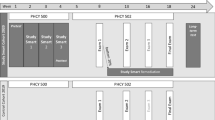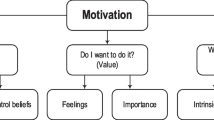Abstract
Among the critical components related to the improvement of mathematics learning are the design of high cognitive demand tasks and teachers’ ability to maintain these cognitive demands during their implementation of lessons. We investigate the factors affecting the maintenance and decline of cognitive demand in the implementation of a statistics lesson by two teachers who participated in a Lesson Study group for third graders (8–9 years old). The results of the investigation show notable changes in the maintenance factors associated with the teachers’ questions and feedback, the scaffolding provided for the students’ reasoning and the modelling of high-level performance. In terms of the decline in the level of cognitive demand, the greatest changes were found in factors corresponding to the routinization of problematic aspects of the task and to problems in lesson management. Based on the results of our collaborative work with teachers in the context of Lesson Study, we conclude that it is possible to design and implement statistical tasks in primary school classrooms that maintain high cognitive demand.



Similar content being viewed by others
References
Bardin, L. (1996). Análisis de contenido [Content analysis]. Colmenar Viejo, Madrid: Ediciones Akal.
Becker, J., & Shimada, S. (Eds.). (1997). The open-ended approach: A new proposal for teaching mathematics. Reston, VA: National Council of Teachers of Mathematics.
Boston, M. D., & Smith, M. S. (2009). Transforming secondary mathematics teaching: Increasing the cognitive demands of instructional tasks used in teachers’ classrooms. Journal for Research in Mathematics Education,40(2), 119–156.
Chilean Ministry of Education [MINEDUC]. (2012). Bases-Curriculares [Syllabus]. Chile: Author.
Common Core State Standards Initiative. (2010). Mathematics. Washington, DC: Council of Chief State School Officers & National Governors Association Center for Best Practices.
Corcoran, D., & Pepperell, S. (2011). Learning to teach mathematics using Lesson Study. In T. Rowland & K. Ruthven (Eds.), Mathematical knowledge in teaching (pp. 213–230). New York, NY: Springer.
Cueto, S., Ramírez, C., & León, J. (2006). Opportunities to learn and achievement in mathematics in a sample of sixth grade students in Lima, Peru. Educational Studies in Mathematics,62(1), 25–55.
Doyle, W. (1988). Work in mathematics classes: The context of student’s thinking during instruction. Educational Psychologist,23(2), 167–180.
English, L. D. (2012). Data modelling with first-grade students. Educational Studies in Mathematics,81(1), 15–30.
Estrella, S. (2018). Data representations in early statistics: Data sense, meta-representational competence and transnumeration. In A. Leavy, M. Meletiou, & E. Paparistodemou (Eds.), Statistics in early childhood and primary education—Supporting early statistical and probabilistic thinking (pp. 239–256). Singapore: Springer.
Estrella, S., Mena, A., & Olfos, R. (2018). Lesson Study in Chile: A very promising but still uncertain path. In M. Quaresma, C. Winsløw, S. Clivaz, J. da Ponte, A. Ní Shúilleabháin, & A. Takahashi (Eds.), Mathematics lesson study around the world: Theoretical and methodological issues (pp. 105–122). Cham: Springer.
Foley, G. D., Khoshaim, H. B., Alsaeed, M., & Nihan Er, S. (2012). Professional development in statistics, technology, and cognitively demanding tasks: Classroom implementation and obstacles. International Journal of Mathematical Education in Science and Technology,43(2), 177–196.
Franklin, C., Kader, G., Mewborn, D., Moreno, J., Peck, R., Perry, M., et al. (2007). Guidelines and assessment for instruction in statistics education (GAISE) report: A preK12 curriculum framework. Alexandria, VA: ASA.
Franklin, C., & Mewborn, D. (2006). The statistical education of preK–12 teachers: A shared responsibility. NCTM 2006 Yearbook: Thinking and reasoning with data and chance (pp. 335–344).
Hart, L. C., & Carriere, J. (2011). Developing the habits of mind for a successful lesson study community. In L. Hart, A. Alston, & A. Murata (Eds.), Lesson study research and practice in mathematics education: Learning together (pp. 27–38). Dordrecht: Springer.
Henningsen, M., & Stein, M. K. (1997). Mathematical tasks and student cognition: Classroom-based factors that support and inhibit high-level mathematical thinking and reasoning. Journal for Research in Mathematics Education,28(5), 524–549.
Hill, H. C., & Charalambous, C. Y. (2012). Teacher knowledge, curriculum use, and quality of instruction: Lessons learned and open issues. Journal of Curriculum Studies,44(4), 559–576.
Isoda, M., & Olfos, R. (2009). El enfoque de resolución de problemas en la enseñanza de la matemática a partir del estudio de clases [The problem solving approach in the teaching of mathematics from the Lesson Study]. Valparaíso: Ediciones Universitarias de Valparaíso.
National Council of Teachers of Mathematics [NCTM]. (2000). Principles and standards for school mathematics. Reston, VA: Author.
National Council of Teachers of Mathematics [NCTM]. (2009). Navigating through data analysis and probability in prekindergarten-grade 2 (Vol. 1). Reston, VA: Author.
Olson, J. C., White, P., & Sparrow, L. (2011). Influence of Lesson Study on teachers’ mathematics pedagogy. In L. Hart, A. Alston, & A. Murata (Eds.), Lesson study research and practice in mathematics education: Learning together (pp. 39–58). Dordrecht: Springer.
Ponce, L., Preiss, D., & Núñez, M. (2010). Cognitive demand in the Chilean mathematics lesson. In First Interdisciplinary Congress on Research in Education. Retrieved from http://www.ciie2010.cl/.
Stein, M. K., Engle, R. A., Smith, M. S., & Hughes, E. K. (2008). Orchestrating productive mathematical discussions: Five practices for helping teachers move beyond show and tell. Mathematical Thinking and Learning,10, 313–340.
Stein, M. K., Grover, B. W., & Henningsen, M. (1996). Building student capacity for mathematical thinking and reasoning: An analysis of mathematical tasks used in reform classrooms. American Educational Research Journal,33(2), 455–488.
Stein, M. K., & Smith, M. S. (1998). Mathematics tasks as a framework for reflection: From research to practice. Mathematics Teaching in the Middle School,3(4), 268–275.
Stein, M. K., Smith, M. S., Henningsen, M., & Silver, E. (2000). Implementing standards-based mathematics instruction: A casebook for professional development. New York, NY: Teachers College Press.
Stigler, J., & Hiebert, J. (1999). The teaching gap. New York, NY: Free Press.
Stigler, J., & Hiebert, J. (2004). Improving mathematics teaching. Educational leadership,61(5), 12–17.
Widjaja, W., Vale, C., Groves, S., & Doig, B. (2017). Teachers’ professional growth through engagement with lesson study. Journal of Mathematics Teacher Education,20(4), 357–383.
Yang, Y. (2009). How a Chinese teacher improved classroom teaching in Teaching Research Group: A case study on Pythagoras theorem teaching in Shanghai. ZDM Mathematics Education,41(3), 279–296.
Acknowledgements
This research acknowledges financial support from FONDECYT Project Nos. 11140472, 11140092 and 1171076.
Author information
Authors and Affiliations
Corresponding author
Additional information
Publisher's Note
Springer Nature remains neutral with regard to jurisdictional claims in published maps and institutional affiliations.
Appendices
Appendix 1
Lesson Plan “Snacks”


Appendix 2
Hand-out with data about the snacks

Appendix 3
Original productions by the students in Figure 2 “Two productions in Ada's class: one student classifies the variables into two categories and another student classifies in three categories”

Rights and permissions
About this article
Cite this article
Estrella, S., Zakaryan, D., Olfos, R. et al. How teachers learn to maintain the cognitive demand of tasks through Lesson Study. J Math Teacher Educ 23, 293–310 (2020). https://doi.org/10.1007/s10857-018-09423-y
Published:
Issue Date:
DOI: https://doi.org/10.1007/s10857-018-09423-y




